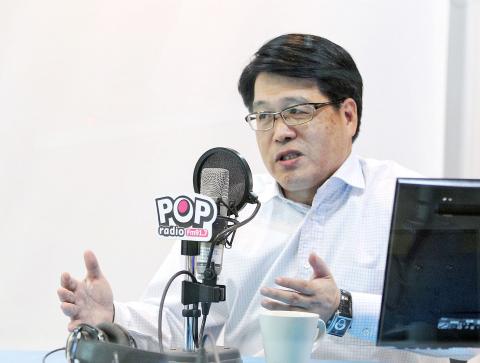Taipei Mayor Ko Wen-je (柯文哲), if he runs for president in 2020, might have a similar magnitude of influence as People First Party Chairman James Soong (宋楚瑜), who nearly won the 2000 presidential election as an independent candidate, Taiwanese Public Opinion Foundation chairman You Ying-lung (游盈隆) said yesterday.
In a radio interview, You commented on Ko’s rising popularity and his potential candidacy.
“Ko might well be the next James Soong judging from the structure of his support base,” You said.

Photo: CNA
Soong, who entered the 2000 race as an independent after losing the Chinese Nationalist Party’s (KMT) presidential nomination to then-vice president Lien Chan (連戰), was then expelled from the KMT and the party accused him of embezzling millions of US dollars from it in what became known as the Chung Hsing Bills Finance scandal.
Soong lost the election to the Democratic Progressive Party’s (DPP) candidate, Chen Shui-bian (陳水扁), by 312,805 votes, but beat Lien by more than 1.7 million votes.
Ko enjoys a degree of popularity similar to Soong’s ahead of the 2000 race and is the nation’s favorite politician, surpassing Premier William Lai (賴清德), You said.
A foundation opinion poll released on Sunday found that Ko scored 66.75 on the “feeling thermometer,” which is gauged between zero and 100, compared with Lai’s 63.44.
However, it remains to be seen if Ko can match Soong’s political influence, You said.
Soong, as a former Taiwan Province governor, had the support of the provincial government and he had built up local political networks loyal to him through decades of effort, You said.
“A fast-rising star like Ko Wen-je might not have the same degree of local support James Soong had,” You said.
Increasing tension between Ko and the DPP is evidence that it finds his popularity threatening, You said.
DPP lawmakers have signed a petition urging the party to nominate its own candidate for next year’s Taipei mayoral election, which it did not do in the 2014 election, and DPP Legislator Cheng Pao-ching (鄭寶清) on Monday accused Ko of trying to curry favor with Beijing and turning voters against the DPP.
“It is the ‘Godzilla’ phenomenon. [Ko has become] a powerful monster that frightens all and provokes attack,” You said.
For people outside the political sphere, Ko’s straightforward manner makes him appear unpretentious and his criticism of the DPP administration’s unpopular policies, such as the Forward-looking Infrastructure Development Program and pension reforms, have aligned him with the public, You said.
The recent Cabinet reshuffle has shown disappointed supporters that President Tsai Ing-wen (蔡英文) can make wise decisions at critical moments, You said, pointing to Sunday’s poll that found her approval rating boosted by 16.6 percentage points to 46.4 percent.
Tsai approved of the unpopular workweek policy, but the new Cabinet must now amend it because employers and employees do not like it, You said.

CHANGING LANDSCAPE: Many of the part-time programs for educators were no longer needed, as many teachers obtain a graduate degree before joining the workforce, experts said Taiwanese universities this year canceled 86 programs, Ministry of Education data showed, with educators attributing the closures to the nation’s low birthrate as well as shifting trends. Fifty-three of the shuttered programs were part-time postgraduate degree programs, about 62 percent of the total, the most in the past five years, the data showed. National Taiwan Normal University (NTNU) discontinued the most part-time master’s programs, at 16: chemistry, life science, earth science, physics, fine arts, music, special education, health promotion and health education, educational psychology and counseling, education, design, Chinese as a second language, library and information sciences, mechatronics engineering, history, physical education

DEADLOCK: As the commission is unable to forum a quorum to review license renewal applications, the channel operators are not at fault and can air past their license date The National Communications Commission (NCC) yesterday said that the Public Television Service (PTS) and 36 other television and radio broadcasters could continue airing, despite the commission’s inability to meet a quorum to review their license renewal applications. The licenses of PTS and the other channels are set to expire between this month and June. The National Communications Commission Organization Act (國家通訊傳播委員會組織法) stipulates that the commission must meet the mandated quorum of four to hold a valid meeting. The seven-member commission currently has only three commissioners. “We have informed the channel operators of the progress we have made in reviewing their license renewal applications, and

The High Prosecutors’ Office yesterday withdrew an appeal against the acquittal of a former bank manager 22 years after his death, marking Taiwan’s first instance of prosecutors rendering posthumous justice to a wrongfully convicted defendant. Chu Ching-en (諸慶恩) — formerly a manager at the Taipei branch of BNP Paribas — was in 1999 accused by Weng Mao-chung (翁茂鍾), then-president of Chia Her Industrial Co, of forging a request for a fixed deposit of US$10 million by I-Hwa Industrial Co, a subsidiary of Chia Her, which was used as collateral. Chu was ruled not guilty in the first trial, but was found guilty

Taiwan People’s Party (TPP) Chairman Huang Kuo-chang (黃國昌) yesterday appealed to the authorities to release former Taipei mayor Ko Wen-je (柯文哲) from pretrial detention amid conflicting reports about his health. The TPP at a news conference on Thursday said that Ko should be released to a hospital for treatment, adding that he has blood in his urine and had spells of pain and nausea followed by vomiting over the past three months. Hsieh Yen-yau (謝炎堯), a retired professor of internal medicine and Ko’s former teacher, said that Ko’s symptoms aligned with gallstones, kidney inflammation and potentially dangerous heart conditions. Ko, charged with